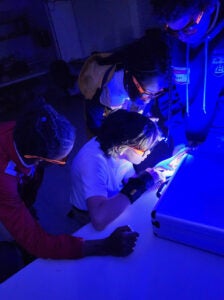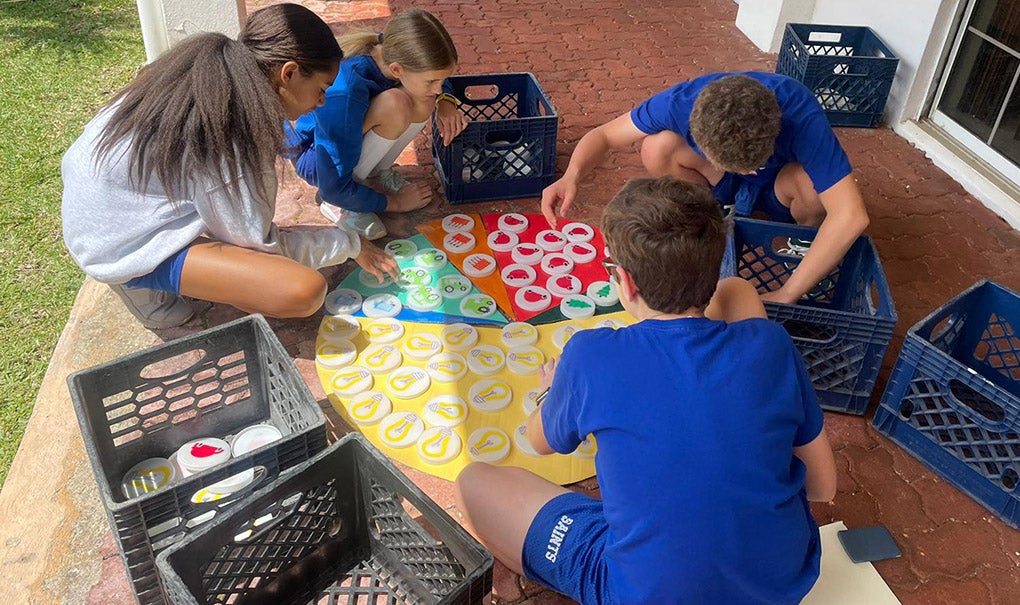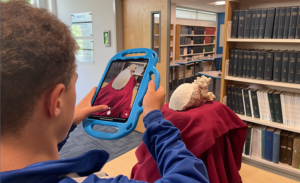Students successfully complete the “Climate Classroom” learning how to incorporate climate data into future careers
A new collaboration between BIOS and the Overview Collective provided an exciting educational opportunity for Bermudian students called The Climate Classroom. With support from lead sponsor HSBC, over 200 students participated in this gamified immersive learning experience for M2 students across Bermuda from April 18th– May 2nd. The spokesperson said, “HSBC Bermuda is delighted to be the lead sponsor for this important education program on climate change and its impact on Bermuda’s marine life. We believe this learning experience will equip our students with the tools they need to make a positive impact on the environment and contribute to a sustainable future.”
The Climate Classroom invited students to explore the BIOS campus, learning about the impacts of climate change on marine ecosystems and the economy in Bermuda through the Curriculum Enrichment Program within BIOS’s Ocean Academy. Students were exposed to future green careers in marine biology, environmental engineering and emerging media such as extended reality [XR] and the metaverse.
“This training allowed Ocean Academy to leverage multiple collaborations to highlight the nexus of BIOS’s atmospheric and ocean research and climate communications,” said Kaitlin Noyes, director of education and community engagement at BIOS.

Students from Saltus Grammar School use ultraviolet glasses and lights to decode invisible ink clues about coral bleaching.
Joining the Ocean Academy education team as experience and design leaders were co-founders of the Overview Collective: Tarik Mohamed, chief creative officer and Kristin Gutekunst, chief executive officer. Both have extensive experience in immersive experience design with a particular specialty in XR and public engagement around sustainable development.
The majority of the workshop was student-led, eliciting interactive discussions, creative design and hands-on problem solving in the classroom and around the BIOS campus. Through the escape room-style quest, students applied middle school math and science skills to tackle puzzles and clues related to ocean temperature, hurricane intensity, and coastal vulnerability.
Students also used virtual reality [VR] to train like marine biologists by tagging manta rays, monitoring ocean health and measuring changes in coral reef biodiversity using The Hydrous’ “Explore VR” experience. Students also had the opportunity to learn about photogrammetry by scanning coral specimens and converting them into augmented reality [AR] 3D objects to import into Roblox Studio and a Beta version of Reach (created by Emblematic Group) to create their own metaverse worlds.
The Climate Classroom was a highlight for Kenzo Riley, an M2 at Dellwood Middle School. He said, “It is good for us to learn about the ocean as Bermudians, we learned today about bleaching coral and when we are out swimming now in the summer we understand what may be happening if the ocean gets hotter. If I had to tell a friend about this field trip, I’d say it was so fun and educational that I don’t want to leave BIOS now, we learned a lot in such a short amount of time today.”
Science communication is key to enabling the general public to better understand the environment and how it is changing, and this workshop presented a tremendous opportunity to inspire young minds early in their journeys. This was also a chance to demonstrate that there are many future careers, from business to computer science, that can also incorporate action on climate change.

Students from Mount Saint Agnes Academy assemble a human pie graph representing sources of carbon dioxide by industry.
During the workshop, the Overview Collective’s Mohamed led students in creating their own 3D scans, introducing students to the basics of augmented reality – and teaching students to import objects into their own worlds. Along with Gutekunst, students explored multiple platforms to create their own ocean scenes in the metaverse. These sessions served as an opportunity for students to learn about photogrammetry and how it is used in ocean science.
Mohamed said, “While most of the students had played Roblox, for many this was their first introduction to AR and photogrammetry by scanning and importing models of real corals. We loved watching them laugh when they made mistakes, and their eyes light up when they successfully created their mini worlds. It was incredible how fast they picked up the design concepts and the climate messaging therein. Overall they expressed how much they enjoyed the various XR experiences and stated a strong interest in exploring this medium further.”
“The Climate Classroom was also a highlight for Akinyi Apopa, an M2 teacher at Sandys Secondary Middle School. She said, “What excited me the most was that students had the opportunity to explore the intersection between their recreational gaming and the issues surrounding climate change. The Climate Classroom workshops sparked their curiosity in a unique and really engaging way that has opened their eyes to entrepreneurship, as well as careers in technology, marine and environmental sciences.”

A student from Mount St. Agnes Academy creating a 3-dimmensional scan of two Bermuda hard coral skeletons.
Alongside the BIOS Education team, the Overview Collective designed the climate quest. The quest was engineered to introduce students to the climate data that BIOS collects, with a specific focus on creating engaging ways for students to explore topics around how Bermuda is and will continue to be impacted by climate change. The course encompassed lockboxes, riddles, invisible ink clues and gameplay to explore topics such as hurricanes, greenhouse gasses, coral bleaching and ocean acidification.
“I have loved seeing the students complete the Climate Quest. The students worked together to find the answer to scientific questions and discover new information – often without even realizing they are learning something new,” said BIOS education coordinator Alex Merkle-Raymond.
“It’s great to work with them outside of the classroom where they are excited to run around BIOS’s campus and understand the impact climate change will have on coral bleaching, ocean acidification, and hurricane intensity in Bermuda. Hopefully the students are able to take away some of the effects and spread awareness to their communities.”
The Overview Collective team worked in partnership with BIOS community partner, Planet Math, bringing on co-founder Sergio Pitcher and Kim Mensah to provide their math tutoring expertise and help support the students through the five quest stations. Pitcher said, “The team has worked really hard to design a fun and engaging quest. I thought it was great to see that in action, to see the kids engage and work together to solve the clues at each station.”
Noyes said, “We are very proud of what this collaborative team was able to accomplish in this workshop to find new and exciting ways to bring awareness of climate change and highlight the invaluable research that BIOS undertakes to better understand our planet. We hope to continue co-designing and innovating this type of hands-on learning opportunities alongside HSBC for these and other talented youth in the future.”
Watch the Climate Classroom Student Edition reel and Field Trip reel on YouTube.
